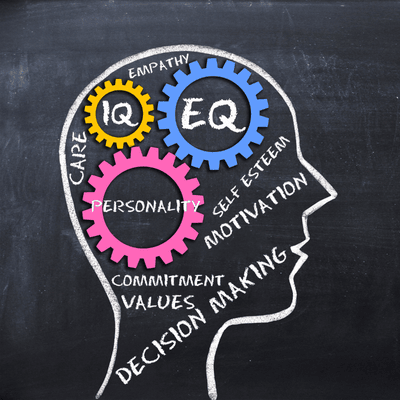In an era where remote work has become the new norm, leading a virtual team goes beyond just assigning tasks and holding meetings. If you’re managing a remote team, you’ve likely already realized it requires much more than just getting things done. It requires connection—understanding emotions, building trust, and keeping everyone aligned despite the physical distance.
That’s where Emotional Intelligence (EQ) comes into play. EQ is your superpower for managing remote teams. It helps you stay in tune with your team members’ emotions, communicate better, resolve conflicts more smoothly, and, ultimately, boost team performance and morale.
In this post, we’ll dive into why emotional intelligence is a game-changer for managing remote teams and how you can leverage it to create a thriving, productive team.
What is Emotional Intelligence (EQ)?
Before we dig into its importance, let’s define Emotional Intelligence, or EQ. Simply put, EQ is the ability to understand, manage, and express your own emotions, while also recognizing and influencing the emotions of others. It has five key components:
- Self-awareness: Knowing your own emotions and how they affect your thoughts and actions.
- Self-regulation: Being able to control impulsive feelings and behaviors, manage stress, and adapt to changing circumstances.
- Empathy: Understanding and sharing the feelings of others.
- Social skills: Building and maintaining healthy relationships, communicating clearly, and managing conflict effectively.
- Motivation: Being driven to achieve personal goals and stay resilient in the face of setbacks.
Now, why does this matter in leadership? Well, leading a team—especially remotely—means dealing with diverse personalities, emotions, and challenges on a daily basis. EQ gives you the tools to navigate these situations effectively, keeping your team engaged and productive.
The Unique Challenges of Managing Remote Teams
Managing a team remotely comes with its own set of challenges. Without the natural rapport that face-to-face interaction provides, you have to work harder to keep everyone connected, engaged, and trusting each other. Here’s why emotional intelligence is so crucial in overcoming these hurdles:
Lack of Face-to-Face Interaction
In a physical office, you can easily pick up on subtle emotional cues—body language, tone of voice, or even a sigh across the room. But when you’re managing a team spread out across various locations, these emotional cues are much harder to read. Emails can feel flat, and virtual meetings often lack the same connection as face-to-face discussions. Without EQ, misunderstandings and feelings of isolation can creep in.
Building Trust Virtually
Let’s face it—trust is harder to build when you’re not physically working together. Remote teams often rely on video calls and chat messages, which don’t always capture the full emotional context of a conversation. Leaders with high emotional intelligence understand how to foster trust, even when they can’t see their team in person. This involves being transparent, consistent, and emotionally available, even across screens.
Managing Diverse Teams Across Cultures
Remote teams are often culturally diverse, which is a huge asset but also presents emotional challenges. Different cultures approach work, communication, and even conflict in varying ways. A leader with strong emotional intelligence is aware of these differences and adapts their management style accordingly, ensuring that everyone feels understood and valued, no matter where they’re located.
Why Emotional Intelligence is Key for Managing Remote Teams

Enhancing Communication
Leaders with high emotional intelligence are like expert translators. They’re able to read between the lines of digital communication, interpreting not just what’s being said, but what’s left unsaid. In remote teams, where most communication happens via text or video, EQ helps you understand the emotions behind the words. For example, if a team member’s email seems unusually curt, an emotionally intelligent leader might sense underlying frustration and address it before it festers.
Boosting Team Morale and Engagement
Remote work can sometimes feel lonely or disengaging. As a leader, part of your job is to keep morale high, and emotional intelligence plays a key role in this. When a team member is feeling disconnected or overwhelmed, emotionally intelligent leaders notice these subtle signs and act proactively. Whether it’s through virtual check-ins, celebrating milestones, or offering personalized feedback, these leaders ensure that everyone feels valued and motivated.
Conflict Resolution
Let’s face it—conflicts are inevitable in any team, but they can be trickier to handle in a remote setting. High EQ enables leaders to manage conflict with grace, understanding the emotions driving the tension. Instead of letting frustrations simmer under the surface, emotionally intelligent leaders create safe spaces for open communication and offer empathy when navigating sensitive conversations.
Building Trust and Fostering Collaboration
Trust is the foundation of any successful team, and it’s especially critical in remote work. Leaders who are emotionally intelligent build trust by being transparent, approachable, and empathetic. They don’t shy away from vulnerability, which fosters a culture of openness and collaboration. When teams feel safe to express their emotions and ideas, they work together more effectively and produce better results.
Increasing Productivity and Performance
When emotional roadblocks like stress or burnout go unaddressed, productivity can plummet. Leaders with emotional intelligence are skilled at recognizing early signs of emotional strain and stepping in before it affects performance. By checking in regularly with team members and creating an emotionally supportive environment, you can help your team stay focused, energized, and productive.
How to Cultivate Emotional Intelligence in Remote Leadership

So, how can you strengthen your emotional intelligence as a remote leader? Here are some actionable strategies to get started:
Developing Self-Awareness
The first step is to become more aware of your own emotions and how they influence your leadership. Take time to reflect on how you respond to stress, feedback, and challenges. Journaling can be a helpful way to track your emotional patterns and identify triggers that may affect your leadership style.
Practicing Empathy
Empathy is crucial for remote leadership. Make it a habit to actively listen to your team members during meetings. Ask open-ended questions that encourage them to share how they’re feeling, and make sure to acknowledge their emotions, even if you can’t fix the situation immediately. Sometimes, just knowing that someone is listening makes all the difference.
Building Strong Virtual Relationships
Strong relationships are built on consistent, meaningful interactions. Regular virtual check-ins, one-on-ones, and team-building activities are great ways to nurture relationships within your remote team. It doesn’t have to be all business—ask about your team members’ lives outside of work to show you care about them as people, not just employees.
Maintaining Open Channels of Communication
Encourage your team to share their feelings, struggles, and successes openly. By creating a culture of transparency, you’ll help your team members feel comfortable voicing concerns and seeking support when needed. This builds trust and keeps communication flowing, even when everyone is miles apart.
Tools to Help You Develop Emotional Intelligence in Your Leadership

Building emotional intelligence doesn’t happen overnight. Luckily, there are tools and resources to help you on your journey.
1. Online EQ Assessments
Take an EQ assessment to get a sense of where you stand. Tools like EQ-i 2.0 or MindTools Emotional Intelligence Quiz can help you identify your emotional strengths and areas for growth.
2. Mindfulness and Stress Management Apps
Mindfulness is key to staying emotionally balanced. Apps like Headspace and Calm offer guided meditations and stress-relief techniques that can help you stay calm under pressure and regulate your emotions.
3. Communication and Feedback Platforms
Platforms like Slack, Zoom, and 15Five are essential for fostering open communication and providing timely feedback, which are critical components of emotional intelligence in leadership.
4. Emotional Intelligence Training Programs
For those looking to dive deeper, programs like Search Inside Yourself (originally developed at Google) or Daniel Goleman’s Emotional Intelligence Coaching offer structured training on self-awareness, empathy, and leadership skills.
How to Integrate These Tools into Your Leadership Routine
Start small. Begin with an EQ assessment to establish your baseline, then gradually incorporate mindfulness practices or communication tools. Set development goals based on the insights you gain and track your progress over time. Remember, emotional intelligence is a journey—commit to continuous growth.

Embrace Emotional Intelligence to Elevate Remote Leadership
To sum it up, emotional intelligence is essential for managing remote teams effectively. It enhances communication, builds trust, and helps you navigate the emotional dynamics that come with working remotely. At DigiWorks, we know the importance of emotionally intelligent leadership in building strong, cohesive remote teams. Whether you’re looking to expand your global talent pool or improve your remote team management, DigiWorks can help you scale your business while fostering a supportive, collaborative environment.
Ready to take your leadership to the next level? Contact DigiWorks today and let us help you build a remote team rooted in emotional intelligence and long-term success.
Keep Reading: Remote Team Management 101: Virtual Leadership Skills You Should Have!
